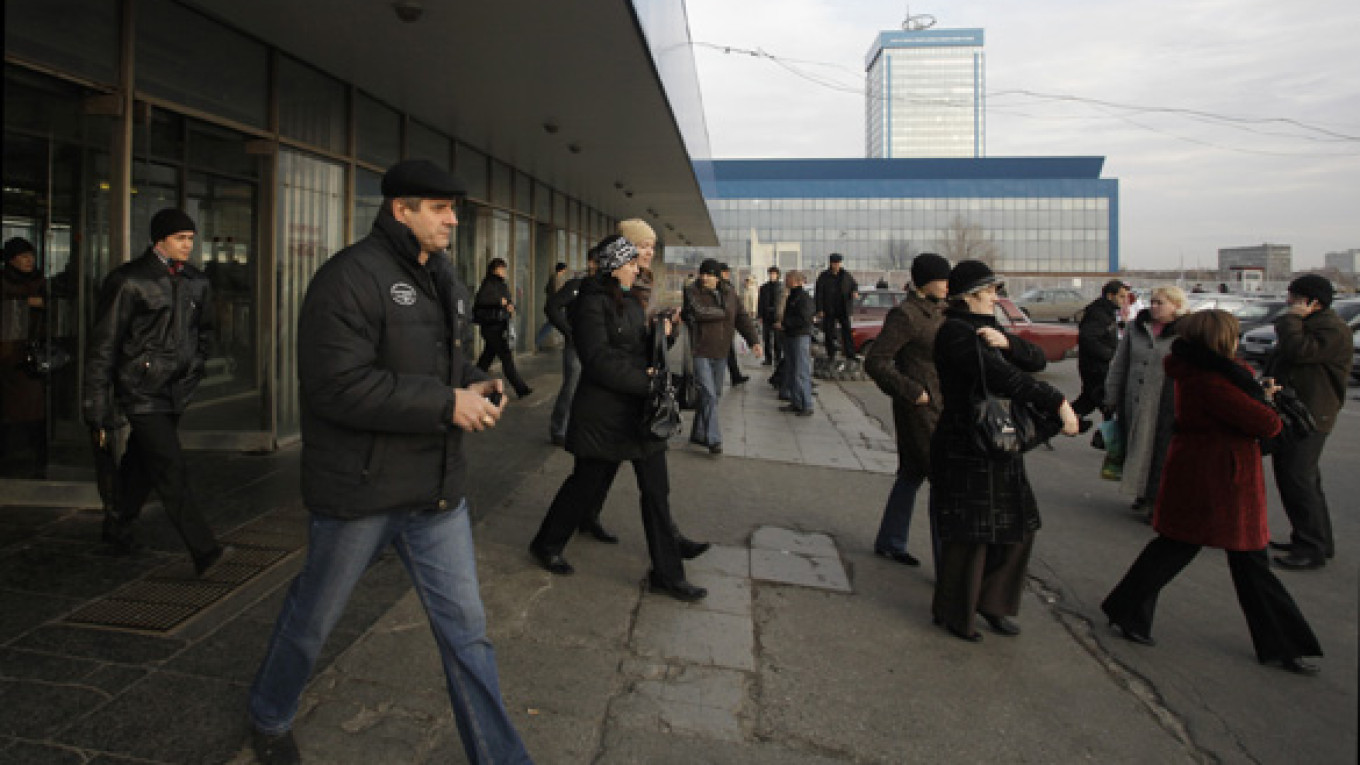The Mortgage Loans Restructuring Agency, or ARIZhK, developed the program to relocate residents of single-industry towns to other parts of the country, director Andrei Yazykov told Vedomosti.
The first potential participants will be residents of Tolyatti, who will be offered the chance to move to the Leningrad region city of Tikhvin to get jobs at a factory owned by the financial and industrial group IST, Alexander Semenyaka, head of ARIZhK, said Wednesday, Prime-Tass reported.
He was referring to a new wagon factory that will begin working by the end of the year and employ 3,500 people, an IST group spokesman said. "We're interested in having an outside work force come in, including from AvtoVAZ, since its workers are familiar with assembly-line production, which we'll also be using," he said.
The company is already building housing for them. This year, 450 to 500 families will be able to move under the ARIZhK program, and the agency is willing to spend 400 million to 500 million rubles ($13.2 million to $16.5 million) to that end, Yazykov said. Since housing is more expensive in Tolyatti than in Tikhvin, people who move most likely won't need mortgages, he said.
According to ARIZhK's calculations, there are more than 350 single-industry towns in Russia, including 17 where the situation has reached crisis levels and 60 that could end up in crisis soon.
ARIZhK was scheduled to discuss the details of the program with the Association of Russian Banks on Thursday, and Vedomosti was able to learn about the financial details from the presentation for the bankers.
After receiving ARIZhK approval for help moving, a person relocates to the new city, where he or she is given temporary housing in a dormitory, gets a job and looks for a new home. The agency then appraises the old apartment and uses that as collateral to give a two-year loan at two-thirds of the Central Bank's refinancing rate, or 5.8 percent now. The size of the loan would be equal to the value of the apartment minus the interest that would accrue over the two years.
The money must then be spent on housing in the new region, and if the sum is not enough, the worker would need to get a mortgage. The program participant would then have two years to sell the old apartment or hand it over to ARIZhK.
Neither the individual nor the agency will end up in the red, Yazykov said, adding that he was counting on housing prices to start rising — even in economically struggling single-industry towns.
The most difficult part of the plan is appraising the old apartments, Yazykov said. Real estate prices are near rock bottom, meaning people could only sell apartments at a considerable loss, which is preventing labor migration. "Our scheme will allow people to get as much money as possible now, and then settle up later, when the real estate market is on the rise," he said.
If the AvtoVAZ workers are successfully resettled, the program will be used in other single-industry towns, Yazykov said. "In that case, we'll seek financing approval from AIZhK's supervisory board."
No new budget funds would be needed, as AIZhK has the resources to finance the program, a source close to AIZhK said.
Tolyatti real estate prices average 34,700 rubles ($1,150) per square meter, said Sergei Zholneruk, director of the local agency Zhilishchny Proyekt. The price per square meter for a new apartment in Tikhvin is 20,000 rubles to 30,000 rubles, said Igor Gorsky, managing director of the St. Petersburg-based Real Estate Development and Research Agency. He said the price was just an estimate, however, as there have been very few deals.
AvtoVAZ is transferring about 12,000 people to subsidiaries, but it is unlikely that many of them would move, said Nikolai Karagin, head of the company's union. "Officials in Samara are already working on measures to develop other production in Tolyatti. Besides, the Leningrad region has enough of its own unemployed, for example in Pikalyovo," he said.
Over the years, people in Tolyatti have acquired nice apartments and dachas, which will make them reluctant to leave, Zholneruk said, adding that he wasn't worried that ARIZhK's program would sink the local property market. "There are very few buyers, and people are unlikely to sell for less than the appraisal price" set by ARIZhK, he said.
The program's logic is good — the state should help people get out of depressed cities, said Natalya Zubarevich, from the Independent Institute for Social Policy. But she was also surprised by the choice for relocation.
"They're exchanging people's one problem for another, and with state money. Tikhvin is a second Pikalyovo," she said. If they want the program to work, people shouldn't be limited to moving to a specific city, she said.
Yazykov said those limitations would eventually be eliminated.
A Message from The Moscow Times:
Dear readers,
We are facing unprecedented challenges. Russia's Prosecutor General's Office has designated The Moscow Times as an "undesirable" organization, criminalizing our work and putting our staff at risk of prosecution. This follows our earlier unjust labeling as a "foreign agent."
These actions are direct attempts to silence independent journalism in Russia. The authorities claim our work "discredits the decisions of the Russian leadership." We see things differently: we strive to provide accurate, unbiased reporting on Russia.
We, the journalists of The Moscow Times, refuse to be silenced. But to continue our work, we need your help.
Your support, no matter how small, makes a world of difference. If you can, please support us monthly starting from just $2. It's quick to set up, and every contribution makes a significant impact.
By supporting The Moscow Times, you're defending open, independent journalism in the face of repression. Thank you for standing with us.
Remind me later.


